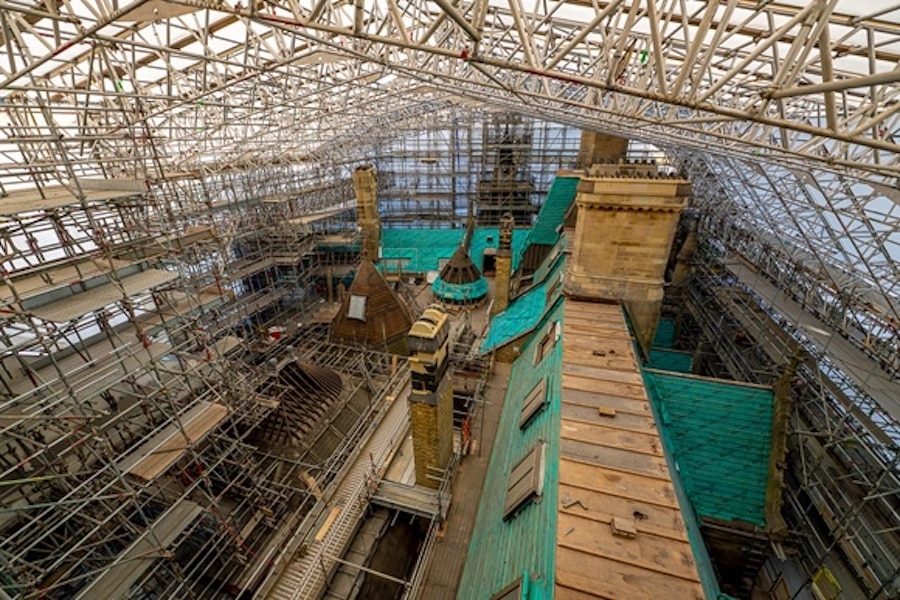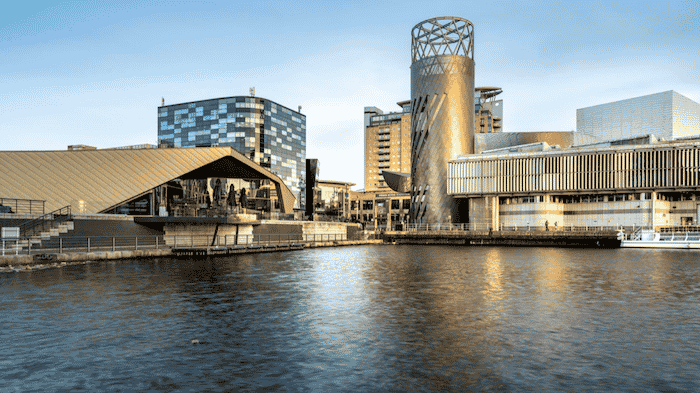Delays expected as Town Hall revitalisation project increases £67m in costs
- Written by Thom Bamford
- Last updated 2 years ago
- City of Manchester, Civic

Despite these obstacles, substantial progress has been made in bringing the Grade I-listed Victorian landmark up to modern safety and accessibility standards, with the construction phase now 60% complete.
The project has remained committed to its objective of delivering economic and social value to Manchester, focusing on maximising positive outcomes for residents, businesses, and the development of construction skills.
Helping Manchester’s local businesses
An impressive 57% of the project’s expenditures are being channelled to Manchester businesses, surpassing the baseline target of 40%.
Additionally, 47% of the workforce employed on the project are residents of the city, exceeding the baseline target of 30%.
Furthermore, the initiative has created 254 jobs within the project team and facilitated 147 apprenticeships, including 54 higher-level apprenticeships.
However, the project’s budget and timeline have encountered setbacks over the past nine months.
As previously cautioned in the October 2022 update, factors such as hyperinflation in the construction industry, pandemic-related delays, and other emerging challenges necessitate additional funding to complete the endeavour.
Consequently, the original completion date of July 2024 will need to be revised.
Unforeseen issues have arisen as the project team accessed previously inaccessible areas within the building’s structure.
For instance, the examination of the roof area has revealed extensive corrosion, cracking, and splitting of the Victorian cast iron drainpipes and gutters, which were not initially visible.
The scarcity of materials
The scarcity of cast iron materials and long lead times for deliveries have contributed to unavoidable delays.
Moreover, the installation of new infrastructure components, including lift shafts, pipes, ducts, and wiring, has been complicated by the building’s idiosyncrasies.
Misaligned floors, chimney flues, and variable vertical spaces have necessitated redesign work, causing further delays.
In line with stricter post-Grenfell fire safety standards, all materials used in the project must undergo certification through laboratory tests or evaluation by independent fire engineers.
However, a backlog in the availability of such testing within the construction industry has added to the project’s challenges and contributed to additional delays.
A £67 million increase in costs
Collectively, the impact of hyperinflation in the construction industry, pandemic-related setbacks, and other unforeseen factors have resulted in a projected £67 million increase in costs.
The project team has diligently worked to mitigate risks and pressures, but the high inflation costs have made it difficult for the project’s contingency budget to absorb the majority of the additional expenses.
To address the funding requirements, the Council’s Executive is set to convene on July 26, 2023, to consider approving an interim funding of £29 million.
This additional funding, obtained through borrowing, will enable the completion of a crucial phase of the construction. Importantly, this funding will not impact existing service budgets.
Repairing the Town Hall Roof
Moving forward, the ongoing work to uncover the Town Hall‘s roof, scheduled to be substantially advanced by the end of this year, will provide greater certainty regarding final costs and timelines.
In January 2024, a request for any further funding required to complete the project will be made, also to be funded through borrowing.
The project’s end date will be confirmed in January 2024 as well.
Should the program be extended to accommodate the delays experienced thus far, the completion could be delayed by up to two years.
However, the project team is working diligently to minimise this timeline and finalise the project as early as possible. Until the program is finalised, the total costs of the restoration cannot be determined.
Deputy Council Leader Cllr Luthfur Rahman
Deputy Council Leader Cllr Luthfur Rahman expressed his pride in the Our Town Hall project, acknowledging its significance as the largest heritage endeavour currently undertaken in the UK.
He highlighted the project’s positive impact on Manchester through job creation, spending with local businesses, and the preservation of the building and its artefacts.
Additionally, the project aims to transform and expand Albert Square into a world-class events space.
The restoration efforts have attracted national attention, even drawing interest from the team working on the equally challenging restoration of the Houses of Parliament.
Acknowledging the magnitude and complexity of the project, Cllr Luthfur Rahman emphasised the unprecedented challenges faced along the way.
However, he reassured the public that the end result would be truly remarkable—a source of pride and an exceptional asset for the city of Manchester.
As the Our Town Hall restoration project faces its remaining hurdles, Manchester eagerly anticipates the re-opening of a city landmark.
- This article was last updated 2 years ago.
- It was first published on 12 July 2023 and is subject to be updated from time to time. Please refresh or return to see the latest version.
Did we miss something? Let us know: press@ilovemanchester.com
Want to be the first to receive all the latest news stories, what’s on and events from the heart of Manchester? Sign up here.
Manchester is a successful city, but many people suffer. I Love Manchester helps raise awareness and funds to help improve the lives and prospects of people across Greater Manchester – and we can’t do it without your help. So please support us with what you can so we can continue to spread the love. Thank you in advance!
An email you’ll love. Subscribe to our newsletter to get the latest news stories delivered direct to your inbox.
Got a story worth sharing?
What’s the story? We are all ears when it comes to positive news and inspiring stories. You can send story ideas to press@ilovemanchester.com
While we can’t guarantee to publish everything, we will always consider any enquiry or idea that promotes:
- Independent new openings
- Human interest
- Not-for-profit organisations
- Community Interest Companies (CiCs) and projects
- Charities and charitable initiatives
- Affordability and offers saving people over 20%
For anything else, don’t hesitate to get in touch with us about advertorials (from £350+VAT) and advertising opportunities: advertise@ilovemanchester.com

The welcoming Manchester community where board games build friendships

Everything you need to know about the St George’s Day Parade 2025

Review: Boys From the Blackstuff at LOWRY ‘packs a hard-hitting emotional punch’

Best bars and pubs to watch the football and live sport in Manchester

Discotheque Royale vs Piccadilly 21s: which was your favourite 90s Manchester club?
















